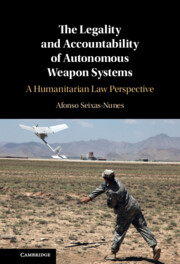Book contents
- The Legality and Accountability of Autonomous Weapon Systems
- The Legality and Accountability of Autonomous Weapon Systems
- Copyright page
- Dedication
- Contents
- Acknowledgements
- Abbreviations
- Introduction
- 1 Introducing Autonomous Systems of War
- 2 AWS
- 3 Autonomous Weapon Systems and ‘Autonomy’
- 4 AWS and the IHL Requirements
- 5 Accountability and Liability for the Deployment of Autonomous Weapon Systems
- Final Conclusion
- Index
1 - Introducing Autonomous Systems of War
The Challenges of Artificial Intelligence
Published online by Cambridge University Press: 05 May 2022
- The Legality and Accountability of Autonomous Weapon Systems
- The Legality and Accountability of Autonomous Weapon Systems
- Copyright page
- Dedication
- Contents
- Acknowledgements
- Abbreviations
- Introduction
- 1 Introducing Autonomous Systems of War
- 2 AWS
- 3 Autonomous Weapon Systems and ‘Autonomy’
- 4 AWS and the IHL Requirements
- 5 Accountability and Liability for the Deployment of Autonomous Weapon Systems
- Final Conclusion
- Index
Summary
Chapter 1 analyses how current research on AI has begun investigating the feasibility of producing autonomous weapon systems (AWS) and the challenges that they represent for current IHL . The fact that they collect and process their own data and make lethal targeting selection without human intervention constitutes the ‘third revolution in military affairs’. AWS will deliver enormous advantages such as the ‘dissociation of risk’ for soldiers, and the ‘dissociation of communication’ between human operators and weapons systems. The element of ‘dissociation of communication’ has been made possible due to the progress in the area of machine learning. Thus, Chapter 1 analyses how machine learning algorithms operate. Indeed, the algorithm designed and programmed for a mission can have a tripartite structure: an algorithm for situation assessment; a selection algorithm; and an algorithm for situation management. In spite of the advantages that AWS may introduce on the battlefield, machine learning algorithms are not deterministic but predictable algorithms and operate as black-box systems. Consequently, AWS cannot be said to be reliable but rather remain unpredictable. Their unpredictable nature will introduce challenges not only in terms of legal reviews and levels of reliability, but also especially in terms of accountability for violations of IHL caused by AWS.
Keywords
- Type
- Chapter
- Information
- The Legality and Accountability of Autonomous Weapon SystemsA Humanitarian Law Perspective, pp. 9 - 44Publisher: Cambridge University PressPrint publication year: 2022

